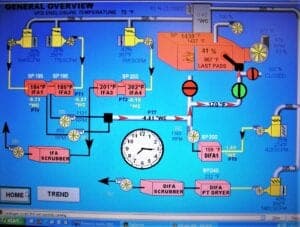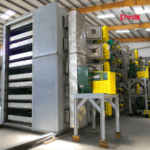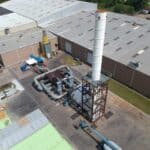Many manufacturing applications and processes require temperatures and other operating parameters in an industrial oven or furnace to be controlled accurately, in real-time with minimal delays. A metal curing process for example, often requires the curing of adhesives or various polymers materials and their bonding to the metal surface, a highly temperature-sensitive process. The temperature affects the reaction kinetics and, more importantly, the atomic structure of the particular substance. The conversions of the atomic structure configurations occur at a specific temperature, and reaching the nearest temperature to target one is essential for manufacturing durable and high strength materials.
One of the most troublesome issues in industrial Oven and Furnace applications is maintaining the target temperature uniformly across all oven sections. The excessive production demands and the cost of high quality products are followed by overwhelming operating costs, especially in the aerospace industry. It is critical for production to have a reliable and precise thermal treatment with every batch. Manufacturers must apply the curing process to smaller production parts to ensure that the material’s target tensile strength and durability are reached. Since the curing process often represents the production process’s bottleneck, there is a need for investment into multiple ovens that will make up for excessive retention times and enable continuous production.
During its over 40+ years in business, Epcon Industrial Systems continues to invent solutions that meet a variety of customer’s needs, which implies the highest quality production of parts with accurate control of operating parameters and real-time monitoring.
The curing process is often highly demanding in terms of the need for multiple sessions with different retention times and operating conditions. The issue with entering operating parameters manually between sessions is that it leaves a space for a human error, but more importantly, it causes operational delays between process’ stages The production of airplane parts needs a highly-controlled production environment to ensure that part will remain stable at variable pressures and extremely low temperatures in the stratosphere.
Epcon Industrial Systems designs custom PLC (Programmable Logic Controller) that directly controls the oven operation, including all fans, vacuum manifolds, and electric heaters. The oven control system is designed specifically to satisfy complex batch process operational requirements.
The control system allows operators to monitor the oven via air thermocouples or individual thermocouples using multiple thermocouples for redundancy. The oven is commonly supplied with 4 ”J” type thermocouples that continuously monitor the temperature in all parts of the chamber. According to customers’ needs, the number of thermocouples and their positioning may be modified during the engineering process for the best operating scenario by Epcon’s engineering team.
These thermocouples shall be permanently installed in the oven through the oven walls. High sensor sensitivity at various air humidities and temperatures is enabled using the thermocouples in the form of sheathed grounded junction elements with industrial protection head. The thermocouple I/O points on the PLC are wired to a control panel. The PLC I/O modules are designed so that separate outputs such as RPM of the fans’ motors and damping actuators are programmed to act according to the one particular thermocouple’s response, making an energy-optimized system at all times.
The firm proof that this type of control configuration is indeed the optimal solution for large batch curing ovens is its recent application in the Aerospace industry. Epcon Industrial Systems designed the system and tested with 50 thermocouples at different places within the large capacity oven. During the testing, all thermocouples registered temperatures within 5 °F from the set temperature, showing the uniform temperature distribution in all chambers sections.
Another addition in the oven was a unique precise rotating device to rotate to Rocket Motor Casing during the curing process. The rotating device was run by a rotation system servo motor drive, interfaced with PLC and operated from Panel-View. The rotating device’s addition significantly contributes to equal exposure of all product parts to the direct air stream, ensuring the highest quality of every millimeter of the product unit.


